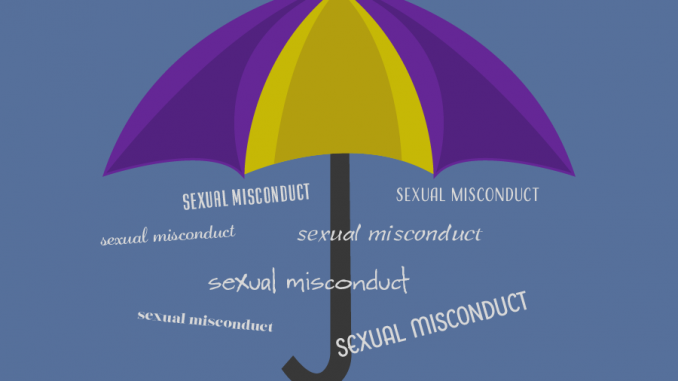
CONTENT WARNING: This story mentions sexual assault and domestic violence that might be upsetting to some readers.
Almost one in four undergraduate and one in ten graduate women experience sexual harassment through physical force, violence or incapacitation, according to RAINN, an anti-sexual violence organization.
On Sept. 23, the Dean of Students emailed students with an assignment to complete an online sexual assault prevention training. Returning undergraduate students are not required to complete the assignment, but first-year undergraduate and graduate students must complete it by Oct. 30 or a transcript hold will be placed on their accounts.
This training came right in time for October, which is Domestic Violence Awareness Month.
Throughout my four and a half years at Temple University, I’ve completed at least three online sexual assault prevention trainings.
One annual online training module is an ineffective primary prevention strategy and should be followed up with required in-class discussions, especially as students can easily click through each module without reading the information or listening to the videos.
To make meaningful change, online training should be tailored to the specific audience and invite attendees to participate, according to Proceedings of the National Academy of Sciences.
Temple’s most recent training includes a series of videos with hypothetical scenarios related to relationships, consent and harassment. Victims in the videos were willing to report the instances of sexual assault or harassment to their peers immediately.
Given that sexual assault is the most underreported crime for teens and adults, according to the National Child Traumatic Stress Network, this inaccurately portrays the aftermath of sexual assault and fails to take into account the trauma a survivor may experience.
Archana Kaku, a gender, sexuality and women’s studies professor, said online trainings are not always reflective of the reality of sexual harassment.
“There are both cultural and institution barriers that lead to the underreporting of sexual harassment and sexual assault,” Kaku said. “We can encourage people to report and try to build a culture that makes that open conversation permissible.”
Andrea Seiss, Temple’s Title IX coordinator, said during her four years at Temple, more students have felt comfortable reporting cases of sexual assault.
“I started this position in June of 2016, and every year since that first year, where we had the lowest number of students coming my way, that number has steadily and somewhat drastically increased,” Seiss said. “I think we have been doing a much better job at the university about getting information out to students.”
The number of cases of domestic and dating violence and stalking on campus doubled between 2017 and 2018, according to Temple’s 2019 annual security and fire safety report. This is likely a gross underestimate, as only 20 percent of female student victims report to law enforcement, according to RAINN.
Temple should modify their online module, just as they have attempted to adapt to the pandemic by hosting guest speakers at online workshops.
On Oct. 1, the Wellness Resource Center hosted “An Evening with Tarana Burke,” a Zoom panel dedicated to sexual harassment activism and healing, postponed from April. Sixty people attended the Zoom lecture, and the livestream has reached about 600 views, said Liz Zadnik, associate director at the center.
“It’s interrogating those belief systems, and then our hope is really to offer lots of different opportunities for folks to engage in the next step with in-person programming,” Zadnik said.
Sixty students is not enough. While it is impossible for every student to attend these workshops, faculty should encourage students by offering extra credit, and Temple should send emails reminding students that Temple has a zero tolerance sexual harassment policy.
Sexual harassment is a systemic issue that needs to be addressed at the university level. Engaging students with the information will reduce stigma and lead to less cases of sexual assault, as well as underreporting, on and off campus.


Be the first to comment